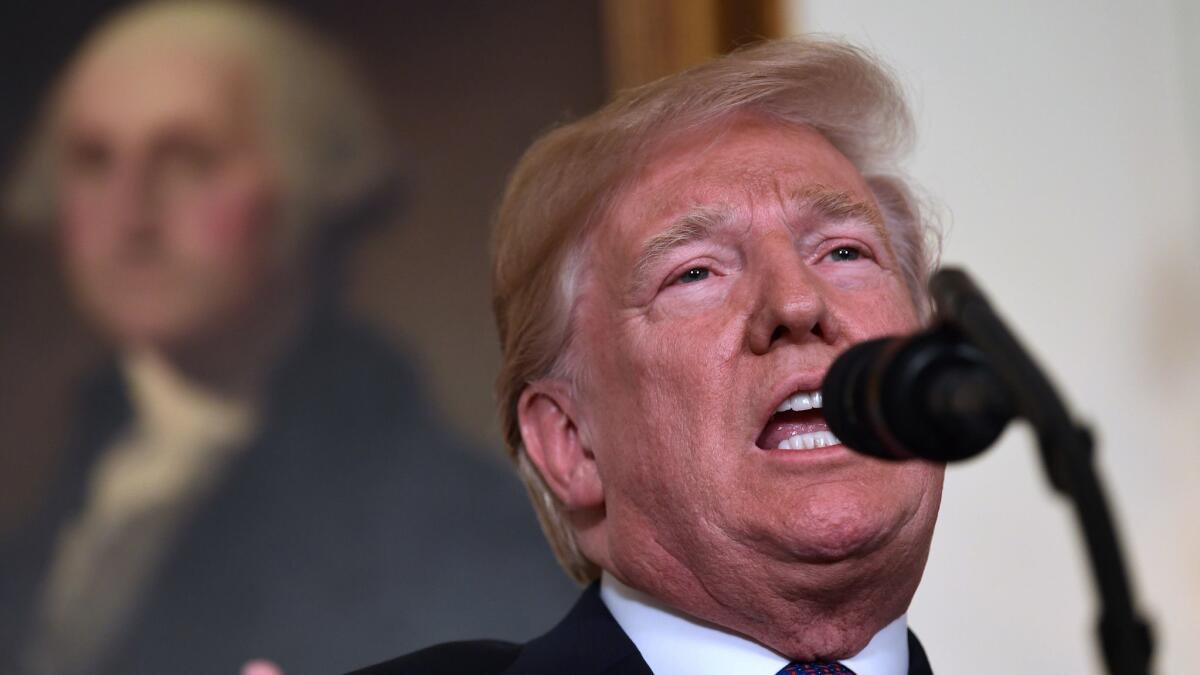Op-Ed: The next Congress needs to take its war powers back

The American political environment is as polarized as it has been in recent memory. But there is one major policy priority that should unite lawmakers on both sides: making the legislative branch relevant on matters of war and peace.
The assumption within the foreign policy establishment is that national security in general, and war-making in particular, are distinct responsibilities of the executive branch. The president is the commander in chief of the armed forces, after all, under Article 2 of the Constitution.
But the legislative branch is not meant to be a bystander. The authors of the Constitution understood that concentrating too much power in the executive branch would start the country down a dangerous road to perpetual war. “War is in fact the true nurse of executive aggrandizement,” James Madison observed astutely, and the temptation to make war “would be too great for any one man.”
The authors also understood that the decision to go to war carries existential consequences, and that no individual should make it alone. It is for these reasons that Congress was granted the exclusive authority to do so under Article 1.
The legislative branch is not meant to be a bystander.
Many of today’s lawmakers ignore this critical concept. Some appear too frightened of the political consequences of difficult votes, while others seem scared of encroaching on the president’s turf. This is enormously unfortunate: History shows that when Congress is silent or skittish, the executive branch will gladly fill the void.
Since the War Powers Resolution of 1973, which constrains when and for how long the president can use military force without congressional authorization, the executive branch has chipped away at the law by claiming a radically expansive view of presidential power. In many cases, presidents have simply disregarded the law as if it were optional.
The executive overreach was begun and exacerbated by presidents from both parties. President Truman assigned tens of thousands of combat troops to South Korea without approaching Congress for statutory authorization. Before Congress passed the Gulf of Tonkin resolution in 1964, the Kennedy and Johnson administrations deepened America’s military involvement in South Vietnam on an expansive interpretation of their Article 2 power.
President George H.W. Bush invaded Panama in an operation to oust Manuel Noriega with the bare minimum of congressional consultation, and the pattern has persisted to this day. When the Syrian government reportedly used chemical weapons in 2017 and 2018, President Trump retaliated with cruise missile strikes. Most of Congress found out about the attacks via Twitter or television news.
Executive war making is not what our founders intended, nor is it how the executive and legislative branches handled their constitutional obligations during the first and second centuries of the American republic. Before the U.S. entered the Mexican-American War in 1846, the Spanish-American War in 1898 or World War II in 1941, Congress listened to the commander in chief’s case and then made the final judgment.
Today, apparently, all the president needs to do is phone congressional leadership for a brief conversation. The founders designed a system of checks and balances to prevent exactly this. But these checks are worthless if the men and women who are supposed to serve this function care more about politics than doing their jobs.
Enter the Fray: First takes on the news of the minute from L.A. Times Opinion »
With the exception of individual lawmakers who have attempted to wrestle their colleagues out of a coma — Sen. Tim Kaine of Virginia and Rep. Ro Khanna of California on the Democratic side, and Sen. Rand Paul of Kentucky and Rep. Walter B. Jones of North Carolina on the Republican side — Congress has watched the imperial presidency grow ever more powerful without a token of resistance. It’s far safer today for career-oriented politicians to allow the president wide discretion and blame the White House when things go awry.
The next Congress can begin to address this imbalance. The House and Senate can exercise its appropriations power to constrain the executive branch from the type of mission creep the U.S. has been prone to embracing, and one that Washington is presently considering in Syria. Senators also have the option of holding up the president’s nominations in order to force the national security bureaucracy to provide more transparency on the innermost workings of the war-making process.
The chairman and ranking members of the national security committees can leverage their seniority to demand regular and substantive briefings from the administration about what U.S. policy is, what it is not and where it is going. And it may prove appropriate for Congress to limit the president’s national security waivers, provisions the executive branch has at times abused in order to continue a policy the president or his Cabinet officials are unable to explain or justify.
Whatever the balance of political power on Capitol Hill next year, incoming members of the 116th Congress need to give the Constitution another read and begin fulfilling their responsibilities as elected officeholders. The alternative is untenable: a largely unaccountable national security establishment that makes decisions on its own, a U.S. military that is already overstretched yet is still being deployed to tertiary conflicts like the civil war in Yemen, and a war on terrorism that never seems to end.
Daniel R. DePetris is a fellow at Defense Priorities and a columnist for the American Conservative. @DanDePetris
Follow the Opinion section on Twitter @latimesopinion or Facebook
More to Read
A cure for the common opinion
Get thought-provoking perspectives with our weekly newsletter.
You may occasionally receive promotional content from the Los Angeles Times.










